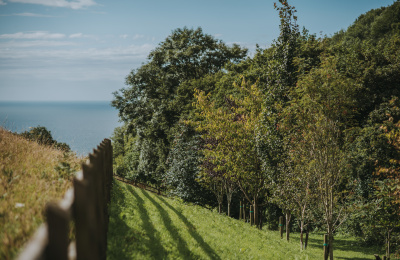Chainsaws and donkeys may not seem to be obvious companions, but staff and volunteers have been clearing rhododendron plants to ensure that Paccombe Farm near Sidmouth, Devon, remains a sanctuary for all types of wildlife.
Conservation officers Daniel Brown and Rob Johns welcomed volunteers from The Donkey Sanctuary and the European Conservation Action Network (EuCAN) Dorset mid-weekers volunteer group on the project to improve the biodiversity of the 90-acre ancient semi-natural woodland.
Rob said: “Rhododendron was introduced in the late 18th Century to our woodlands for pheasant shooting, as it provided good coverage. It became popular in Victorian gardens because of its pretty flower.”
However, rhododendron is a dense and dominant plant which often out-competes native species. A single plant can grow to more than 10 metres high and can cover 100 metres², allowing little sunlight through and producing a dense leaf litter that supresses the woodland ground flora.
Our promise to care for donkeys in the long run requires that we in turn care for the natural environment on sanctuary land. We want to enrich our donkeys’ lives, safeguard our wildlife habitats, and give people the opportunity to connect with donkeys and nature - and our generous volunteer teams help us to do just that.
Hands-on woodland management
Removing rhododendron is no mean feat. With cutting away branches (by hand or chainsaw), treating leftover, and collecting and burning felled branches on the agenda, a real team effort was required to clear the invasive plants. Using tractors to carry out this work would be a risk to native trees, ground flora and sensitive soil structures, so manual removal of rhododendron is essential to protect the habitat from further damage.



Mike Durham, treasurer for EuCAN’s Dorset mid-weekers, said: “The denser part of the area was more like the Amazonian rain forest, but our volunteers liked getting stuck in.”
Not only did the team work hard to remove the invasive species, but they also helped to provide additional habitat in the cleared areas. Log piles were made from the thicker rhododendron trunks that had been cut, and fallen wood was left so that it can decay naturally, creating a great environment for beetles, fungi and much more.
EuCAN and The Donkey Sanctuary
The EuCAN Dorset mid-weekers also work at The Donkey Sanctuary’s East Axnoller Farm, near Beaminster, Dorset, where they have been removing invasive Himalayan balsam and restoring suitable habitat for water voles at two ponds.
EuCAN’s team leader, Dave Searle, said: “At Axnoller we’ve been felling and clearing around two large ponds to encourage the local water vole population to recover.
EuCAN’s volunteers come from a wide range of backgrounds and many of them have been trained through EuCAN to use chainsaws and brushcutters, so the group can offer a full and effective day’s work.
Dave added: “Working at two of The Donkey Sanctuary’s sites has proved very popular with our volunteers, as we have defined goals and we are seeing the fruits of our labours by restoring, enhancing and maintaining the local ecology.”


